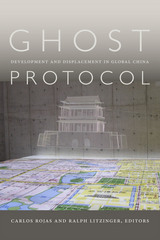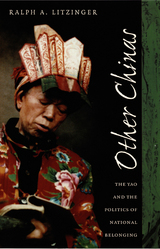2 books about Litzinger, Ralph A.

Ghost Protocol
Development and Displacement in Global China
Carlos Rojas and Ralph A. Litzinger, editors
Duke University Press, 2016
Even as China is central to the contemporary global economy, its socialist past continues to shape its capitalist present. This volume's contributors see contemporary China as haunted by the promises of capitalism, the institutional legacy of the Maoist regime, and the spirit of Marxist resistance. China's development does not result from historical imperatives or deliberate economic strategies, but from the effects of discrete practices the contributors call protocols, which stem from an overlapping mix of socialist and capitalist institutional strategies, political procedures, legal regulations, religious rituals, and everyday practices. Analyzing the process of urbanization and the ways marginalized communities and migrant workers are positioned in relation to the transforming social landscape, the contributors show how these protocols constitute the Chinese national imaginary while opening spaces for new emancipatory possibilities. Offering a nuanced theory of contemporary China's hybrid political economy, Ghost Protocol situates China's development at the juncture between the world as experienced and the world as imagined.
Contributors. Yomi Braester, Alexander Des Forges, Kabzung, Rachel Leng, Ralph A. Litzinger, Lisa Rofel, Carlos Rojas, Bryan Tilt, Robin Visser, Biao Xiang, Emily T. Yeh
Contributors. Yomi Braester, Alexander Des Forges, Kabzung, Rachel Leng, Ralph A. Litzinger, Lisa Rofel, Carlos Rojas, Bryan Tilt, Robin Visser, Biao Xiang, Emily T. Yeh
[more]

Other Chinas
The Yao and the Politics of National Belonging
Ralph A. Litzinger
Duke University Press, 2000
In Other Chinas Ralph A. Litzinger investigates the politics of ethnic identity in postsocialist China. By combining innovative research with extensive fieldwork conducted during the late 1980s and early 1990s in south-central and southwestern China, Litzinger provides a detailed ethnography of the region’s Yao population in order to question how minority groups are represented in China. In particular, he focuses on how elite members of this minority population have represented their own culture, history, and identity to a range of Chinese and Western observers.
Litzinger begins by describing how during the Republican period the Yao were considered a dangerous people who preferred to consort with beasts and goblins rather than join in the making of a modern nation. He then compares this to the communist revolutionaries’ view of the Yao as impressive rebels and positive examples of subaltern agency. Litzinger shows how scholars, government workers, communist party officials, and Taoist ritual specialists have influenced the varied depictions of the Yao and, in doing so, he advances a new understanding of both the Yao and the effects of official discourse, written histories, state policy, and practices of minority empowerment. In addition to analyzing issues of ritual practice, social order, morality, and the governance of ethnic populations, Litzinger considers the Yao’s role in the cultural reforms of the 1980s. By distancing his study from romanticized depictions of minorities Litzinger is able to focus on how minority representation, struggle, and agency have influenced the history of the People’s Republic, cultural debates within contemporary Chinese society, and China’s rapidly changing role in the global order.
This book will be of interest to Asianists in both anthropology and cultural studies and should appeal more generally to scholars invested in issues of ethnic identity, minority politics, and transnationalism.
Litzinger begins by describing how during the Republican period the Yao were considered a dangerous people who preferred to consort with beasts and goblins rather than join in the making of a modern nation. He then compares this to the communist revolutionaries’ view of the Yao as impressive rebels and positive examples of subaltern agency. Litzinger shows how scholars, government workers, communist party officials, and Taoist ritual specialists have influenced the varied depictions of the Yao and, in doing so, he advances a new understanding of both the Yao and the effects of official discourse, written histories, state policy, and practices of minority empowerment. In addition to analyzing issues of ritual practice, social order, morality, and the governance of ethnic populations, Litzinger considers the Yao’s role in the cultural reforms of the 1980s. By distancing his study from romanticized depictions of minorities Litzinger is able to focus on how minority representation, struggle, and agency have influenced the history of the People’s Republic, cultural debates within contemporary Chinese society, and China’s rapidly changing role in the global order.
This book will be of interest to Asianists in both anthropology and cultural studies and should appeal more generally to scholars invested in issues of ethnic identity, minority politics, and transnationalism.
[more]
READERS
Browse our collection.
PUBLISHERS
See BiblioVault's publisher services.
STUDENT SERVICES
Files for college accessibility offices.
UChicago Accessibility Resources
home | accessibility | search | about | contact us
BiblioVault ® 2001 - 2024
The University of Chicago Press









